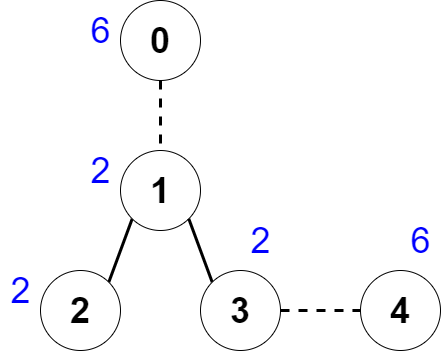Welcome to Subscribe On Youtube
Formatted question description: https://leetcode.ca/all/2440.html
2440. Create Components With Same Value
- Difficulty: Hard.
- Related Topics: .
- Similar Questions: .
Problem
There is an undirected tree with n nodes labeled from 0 to n - 1.
You are given a 0-indexed integer array nums of length n where nums[i] represents the value of the ith node. You are also given a 2D integer array edges of length n - 1 where edges[i] = [ai, bi] indicates that there is an edge between nodes ai and bi in the tree.
You are allowed to delete some edges, splitting the tree into multiple connected components. Let the value of a component be the sum of all nums[i] for which node i is in the component.
Return the maximum number of edges you can delete, such that every connected component in the tree has the same value.
Example 1:

Input: nums = [6,2,2,2,6], edges = [[0,1],[1,2],[1,3],[3,4]]
Output: 2
Explanation: The above figure shows how we can delete the edges [0,1] and [3,4]. The created components are nodes [0], [1,2,3] and [4]. The sum of the values in each component equals 6. It can be proven that no better deletion exists, so the answer is 2.
Example 2:
Input: nums = [2], edges = []
Output: 0
Explanation: There are no edges to be deleted.
Constraints:
1 <= n <= 2 * 10^4nums.length == n1 <= nums[i] <= 50edges.length == n - 1edges[i].length == 20 <= edges[i][0], edges[i][1] <= n - 1edgesrepresents a valid tree.
Solution (Java, C++, Python)
-
class Solution { private List<Integer>[] g; private int[] nums; private int t; public int componentValue(int[] nums, int[][] edges) { int n = nums.length; g = new List[n]; this.nums = nums; Arrays.setAll(g, k -> new ArrayList<>()); for (var e : edges) { int a = e[0], b = e[1]; g[a].add(b); g[b].add(a); } int s = sum(nums), mx = max(nums); for (int k = Math.min(n, s / mx); k > 1; --k) { if (s % k == 0) { t = s / k; if (dfs(0, -1) == 0) { return k - 1; } } } return 0; } private int dfs(int i, int fa) { int x = nums[i]; for (int j : g[i]) { if (j != fa) { int y = dfs(j, i); if (y == -1) { return -1; } x += y; } } if (x > t) { return -1; } return x < t ? x : 0; } private int sum(int[] arr) { int x = 0; for (int v : arr) { x += v; } return x; } private int max(int[] arr) { int x = arr[0]; for (int v : arr) { x = Math.max(x, v); } return x; } } -
class Solution { public: int componentValue(vector<int>& nums, vector<vector<int>>& edges) { int n = nums.size(); int s = accumulate(nums.begin(), nums.end(), 0); int mx = *max_element(nums.begin(), nums.end()); int t = 0; unordered_map<int, vector<int>> g; for (auto& e : edges) { int a = e[0], b = e[1]; g[a].push_back(b); g[b].push_back(a); } function<int(int, int)> dfs = [&](int i, int fa) -> int { int x = nums[i]; for (int j : g[i]) { if (j != fa) { int y = dfs(j, i); if (y == -1) return -1; x += y; } } if (x > t) return -1; return x < t ? x : 0; }; for (int k = min(n, s / mx); k > 1; --k) { if (s % k == 0) { t = s / k; if (dfs(0, -1) == 0) { return k - 1; } } } return 0; } }; -
class Solution: def componentValue(self, nums: List[int], edges: List[List[int]]) -> int: def dfs(i, fa): x = nums[i] for j in g[i]: if j != fa: y = dfs(j, i) if y == -1: return -1 x += y if x > t: return -1 return x if x < t else 0 n = len(nums) g = defaultdict(list) for a, b in edges: g[a].append(b) g[b].append(a) s = sum(nums) mx = max(nums) for k in range(min(n, s // mx), 1, -1): if s % k == 0: t = s // k if dfs(0, -1) == 0: return k - 1 return 0 -
func componentValue(nums []int, edges [][]int) int { s, mx := 0, 0 for _, x := range nums { s += x mx = max(mx, x) } n := len(nums) g := make([][]int, n) for _, e := range edges { a, b := e[0], e[1] g[a] = append(g[a], b) g[b] = append(g[b], a) } t := 0 var dfs func(int, int) int dfs = func(i, fa int) int { x := nums[i] for _, j := range g[i] { if j != fa { y := dfs(j, i) if y == -1 { return -1 } x += y } } if x > t { return -1 } if x < t { return x } return 0 } for k := min(n, s/mx); k > 1; k-- { if s%k == 0 { t = s / k if dfs(0, -1) == 0 { return k - 1 } } } return 0 } func max(a, b int) int { if a > b { return a } return b } func min(a, b int) int { if a < b { return a } return b }
Explain:
nope.
Complexity:
- Time complexity : O(n).
- Space complexity : O(n).